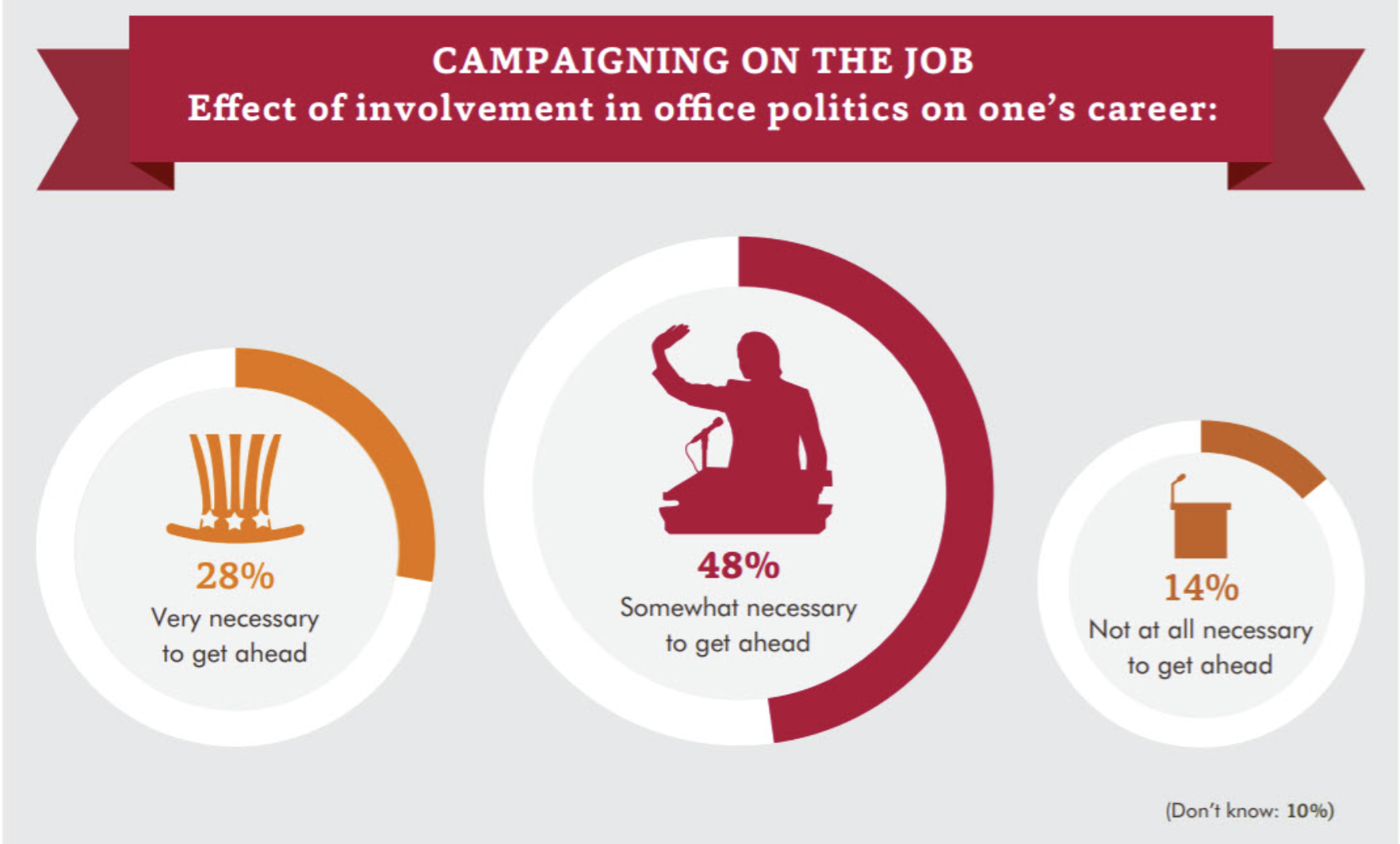Do office politics matter?
According to a survey from Accountemps, they do. Of all the employees surveyed, 80% of respondents reported that office politics exist in their workplace. More than half said they partake in office politics to some degree, and two thirds (66%) said that playing office politics is necessary to get ahead.
Office politics are a fact of life in almost every workplace. From small businesses to large corporations, most organizations have some version of them at play. Most people reflexively shrink from getting involved in them, likely because of the negative behaviors so often associated with them—like gossip or backstabbing, or just operating with inside information.
But looking at office politics through a different lens can shift that perception.
Viewing office politics from the perspective of simple human interactions allows you to operate within that framework in a completely authentic way—and leverage your natural strengths.
In this post, I’m going to talk about how to navigate office politics (yes, even if you’re an introvert) and come out on top—without selling your soul.
The Reality of Office Politics
Office politics can push a lot of buttons with some people. They often conjure up thoughts of rumor mills or manipulation, or just good old-fashioned ass-kissing to gain favor with the boss. But in reality, office politics are usually more subtle than that.
Office politics take place where clear lines of authority aren’t enough to achieve some objective or move some idea forward. They usually involve the use of soft power and social networks to effect a change—for the benefit of an individual, or the organization as a whole.
Office politics are as much about influencing and persuasion as they are about being on the right side of an issue.
While almost every organization has a hierarchy and reporting structure, not every decision gets made within that framework. We often associate office politics with the personal gain of one individual (sometimes at the expense of others), but the motivations and outcomes are usually broader than that.
Are all office politics self-serving? Maybe. But that doesn’t mean that they don’t serve a wider purpose, or that they aren’t necessary.
As much as the modern workplace has changed over the years—from open floor plans to company intranets—the practice of organizational politics is still pretty much the same. In fact, as traditional top-down hierarchies have given way to more distributed organizational models, workers have even more latitude to operate in a sort of “free-agent mode” than ever before.
Delivering on outcomes isn’t so much about managing a team anymore, it’s about making sure your peers and peer organizations also deliver the results you depend on to succeed. As one expert on organizational dynamics puts it, politics is just how power gets worked out on a practical, day-to-day basis.
That doesn’t mean politics are negative or about defeating another party. They’re just another way of advancing a view or an agenda where clear authority is absent. It’s a way to expand the options you have in order to get the results you want.
One of the biggest mistakes you can make is to pretend that office politics don’t exist. Played wrong, they can have a negative effect on the organization and the individuals in it. Done right, they can advance an agenda that’s good for everyone.

Office Politics Can Be an Opportunity — Even for Introverts
Let’s get something out of the way. Introversion is not a disease, and introverts are not office wallflowers. They’re every bit as savvy and as capable of persuasion and influence as the extroverted office rock star. They just do things a little differently.
But mention office politics to an introvert, and they’re likely to die a little inside.
And who can blame them? After all, what’s the first thing you think of when you think of office politics? Conflict? Secret alliances? For many of us, office politics implies a kind of public performance—putting on a show for others that’s inauthentic to who we are. Whether it’s one person taking center stage and dominating a conversation through sheer force of personality, or someone else quietly pulling the strings in the background, there’s an element of insincerity baked in.
And for a lot of people (especially introverts) it’s tempting to stay on the sidelines.
But succeeding in office politics really involves the exercise of soft power, something that introverts are uniquely suited to. In fact, introverts share a lot of characteristics that can help them thrive in their workplace’s political environment.
For one thing, introverts are less distracted by immediate rewards, according to Laurie Helgoe, author of Introvert Power: Why Your Inner Life Is Your Hidden Strength. An introvert is less likely to act impulsively. This can be a huge advantage in navigating office politics because office politics are very often a long game.
Even more importantly, introverts are good listeners. This is an enormous advantage in navigating office politics. A big part of understanding any sensitive issue is getting a sense of all perspectives before making a judgement. A good listener gathers more information from a variety of stakeholders without coming down on one side or another.
An introvert is also not one to hog the show. While there’s nothing wrong with wanting a little attention, remember that office politics operate on human dynamics. While some people may seem like natural” when it comes to speaking in groups and arguing for a position, spotlight-seeking behavior may be very off-putting to others. This can make the issue being discussed a question of personality, instead of business objective or policy.
Introversion is often misunderstood as insecurity—but when it comes to office politics, an introvert’s so-called weaknesses just might be their greatest strengths.
4 Strategies for Navigating Office Politics — No Matter if You’re an Introvert, Extrovert or Ambivert
The notion of office politics may feel icky, but you can navigate them with integrity. You can gain influence within your organization while staying true to yourself and acting ethically.
Acknowledging that you have a part to play in the politics of your organization doesn’t mean you’re compromising your values or pretending to be someone you’re not. You’re simply recognizing that professional environments are still human environments—with competing interests, constrained resources, and sometimes ambiguous lines of responsibility.
Here are four strategies you can use to win the game—and hold your head up in the process.
1. Pay attention
Before you start to think about how you fit in the office politics matrix, put some effort into understanding how your organization works on a cultural level.
- Is your manager partial to one way of doing things over another?
- Does your boss prefer discussing new initiatives in person, while others in the organization use email as the main method of communication?
- What are your company’s core values, and how are they acted on?
- Are short-term results rewarded over long-term objectives?
- Is risk rewarded or discouraged?
- How are key decisions made—and who makes them?
These things are useful to know when approaching leadership about a new idea or a concern you have with an existing initiative.
Being a natural observer, this fact-finding mission is perfect for an introvert, but it may require a bit more concerted effort for an extrovert. Try to focus on noticing verbal and non-verbal cues when people are discussing an issue.
Don’t stop at observing leadership and organizational dynamics, though. Also pay close attention to the individuals on your team and in your broader organization.
- Who speaks up at meetings, and who keeps quiet?
- How do co-workers interact?
- Are there any informal social networks in the organization? What holds them together?
Gaining an understanding of how power and influence play out in your workplace will put you in a much better position to leverage that information when you want to push for your own initiatives—or move ahead in your career.
Know your sphere of influence
Every workplace has constraints. Your manager has to deal with factors beyond his control and so does everyone above him.
There may be many things in your day-to-day work life that you’re not happy about, but can’t control—like procurement policies, or hiring practices—but focusing on those areas can quickly lead to a culture of complaining and finger-pointing.
Instead of focusing on what you can’t control, try to identify the actions you can take to make things better. This will shift you from a mindset of helplessness to one of empowerment.
Focusing on what you can do also signals to the people around you that you are proactive and know how to operate within constraints. Your boss will almost certainly appreciate it, and see you as someone who can adapt to the realities of a situation without sliding into negativity.
Knowing your sphere of influence also gives you a sense of discernment. You don’t need to dive in to every political battle, especially one where you have no real traction.
2. Identify your allies
You should never wait until you have a problem to solve or an objective to achieve to create a network. You should figure out who your most likely allies are and engage with them early. These could be key players throughout your organization, or beyond your own department.
I’m not talking about The Hunger Games here (though sometimes office politics can feel like a fight to the death). I’m talking about seeing where you might have interests that intersect with others’ in ways that are beneficial to both of you. Where’s the common ground?
A good exercise is to create two lists: one is a list of what you need help with, and the other is a list of what you can help others with.
If you’re in Customer Support, can you provide valuable insights to someone in Sales? If you need to make a case to your boss for buying new software, would a testimonial from someone in IT help bolster your position? This exercise has an added benefit of showing you that everyone has something to contribute—and at some point, everyone (even your boss) needs help.
Connecting with others is a natural thing for extroverts—but believe it or not, introverts can do it well, too. There’s a common misconception out there that introverts are shy and socially anxious, but that misrepresents what’s really going on. Introverts might prefer small groups and one-on-one interactions when connecting socially, as opposed to large crowds, but they’re well-suited for building deeper connections in those environments.
By taking the time to find out what other people in your organization care about, how they do their jobs, and what they need, you’re letting them know that you care about what matters to them. They’ll remember that.
Connecting with other people in your organization isn’t just good for you—it’s good for them too. Research has shown that when people feel that they don’t belong to a group, their sense of overall well-being is adversely affected. Office politics (especially negative ones) can leave people feeling isolated and excluded. By reaching out to them, you just might make them feel less lonely and vulnerable.
Quality, not quantity
The more authentic connections you have, the greater your reach, and the more support you’ll have for what you want to push forward.
But take note: You should build relationships with colleagues at all levels of the organization—not just at the top. This means performing your job well and making your boss look good, but also recognizing the good work of your peers, and giving credit where credit is due. Be generous in your praise and in your willingness to help. Chances are, they’ll be happy to return the favor.
One last word on making connections: Be careful about going too far down the road of alliances. Organizations change all the time, and all it takes is one realignment of staff to shift the balance of power. You should have allies across several groups, instead of just one area in your organization. The broader your network, the better.
3. Build trust
Trust is everything.
In my post on water cooler chat, I noted that employees need to feel comfortable and confident for a healthy company culture to develop. There’s a real advantage to building your network in informal spaces. It leads to improved collaboration between team members because of the trust and respect that comes from informal, one-on-one communication.
Conversely, workplace tension is a productivity killer, and arises from an absence of trust.
The more casual (but sincere) interactions between coworkers, the more likely they are to discover similarities. Two people could discover they’re both avid long-distance runners, for example. Or that they have the same alma mater. Or that they both like cats. Small details can still be meaningful and establish a foundation of trust.
According to the Similarity Principle, we trust people more when we see them as being similar to us, or similar to other people we like. In his book Never Split the Difference, Chris Voss highlights this as a critical component of building trust, and notes that if you can trigger that instinct—that sense of “we see the world the same way”—you can gain influence.
Research shows that influence begins with warmth. Warmth acts as a kind of social lubricant. It builds trust and facilitates the absorption of ideas. And warmth is easier to express than you might think. It could be as simple as a nod or a smile, that signals to someone that you are paying attention to what they have to say. Warmth like this is another way to build empathy. As I wrote about in my post on negotiation at work, practicing empathy is one of the fastest ways to build trust.
Remember: People won’t remember what you’ve said, but they will always remember how you made them feel.
Seek first to understand
As Stephen Covey said in his best-selling book 7 Habits of Highly Effective People, one should always seek first to understand, then to be understood.
Personalities and working relationships can sometimes make for a politically charged atmosphere at the office. It’s important to understand what’s at the core of each situation so you can respond in a tactful manner.
For example, let’s say you divulge information about a project that, unbeknownst to you, your manager wasn’t ready to make broadly available. An honest mistake, but one that’s got you in hot water. Instead of getting defensive, you could explain your intentions, and then ask how he thinks you should have handled it. Instead of passing a judgement on his reaction, you’re asking for help.
Office politics isn’t a zero-sum game. You can get results and preserve relationships at the same time.
4. Stay true to yourself
It goes without saying that you should never compromise your personal values for politics of any kind. Your values drive your actions. Navigating office politics with integrity means that you’ll always be able to stand by your actions with confidence.
Be yourself and be up-front about what you’d like to see happen. Hidden agendas have a way of coming out, and they breed distrust. Once trust is broken, it’s hard to get it back.
Get clear on your own goals
In addition to taking stock of how your organization works, you need to be clear on your own objectives if you’re going to leverage that knowledge. Before you can read what other people are thinking and doing, you need to know your own values and goals. Having that kind of self-knowledge helps you determine which battles to fight, and which ones to sit out.
It’s easy to get caught up in the drama of what’s going on around you. When that happens, you run the risk of making impulsive decisions (or taking impulsive actions) that you’ll regret later. By keeping your objectives in mind, you can keep a clear head.
Before taking any action that might be spurred by office politics, ask yourself whether or not it will further the objective you’re trying to achieve.
A Game Worth Playing
Dealing with office politics can be draining. But only if you allow yourself to get pulled in to situations that feel confrontational and driven by personal agendas. That’s the dark side of office politics, and it hinders employee engagement.
If you look at office politics as merely the organizational framework through which people get things done, based on their priorities and their personalities, it becomes less sinister. It isn’t a minefield where you have to play dirty to succeed. It’s more of a landscape that you need to understand so that you can operate within it.
That means paying attention to what’s going on around you, observing others, listening rather than talking—all things that come fairly naturally to introverts, which puts them in the perfect position to persuade others to their cause.
Once you understand where you can exert influence, and who you can help, you’ll be in a far better position to promote the ideas you think are important, and exercise your judgement on where you can (or should) jump.
Best of all, these strategies will help you build a reputation of integrity and reliability with the people around you. In a world of shifting power structures and competing agendas, that alone is worth its weight in gold.













 info@axerosolutions.com
info@axerosolutions.com 1-855-AXERO-55
1-855-AXERO-55


